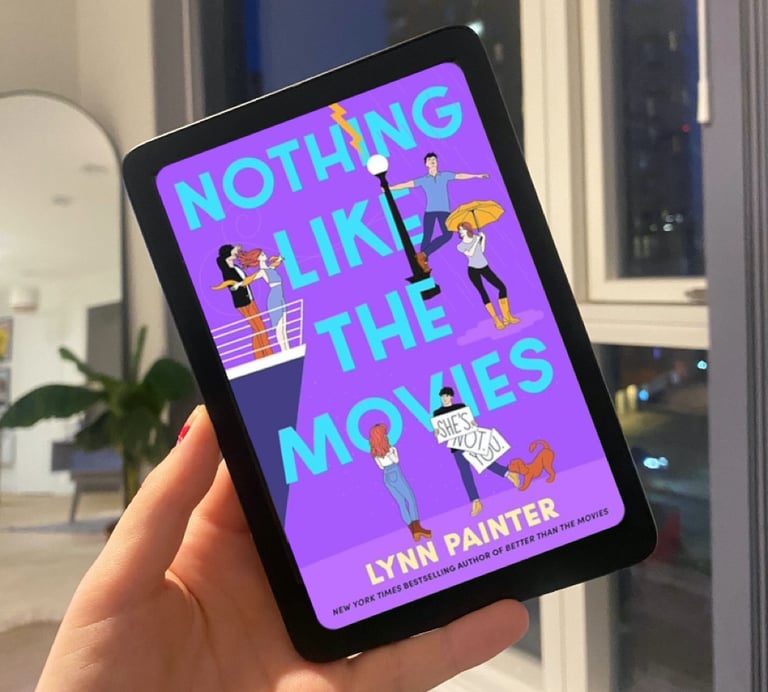
Nothing Like the Movies
Like the movies, some sequels aren't necessary.


I discovered Better Than the Movies earlier this year while looking for a lighthearted read, and I devoured it in a single weekend. So when I found out that Lynn Painter was publishing a sequel, Nothing Like the Movies, I immediately marked my calendar, eager to dive back into the story of Liz and Wes. But, as it turns out, some things don’t quite go as planned (much like the story’s title suggests). From the outset, fans of the original will be caught off-guard to find our once-perfect couple broken up. Worse still, both Liz and Wes are clearly far from moving on, making the reader feel the sting of their unresolved feelings with every page. The beloved characters we grew attached to in the first book seem transformed, and not entirely for the better, as Painter’s decision to separate them has left each of them distant, hardened versions of their past selves.
The start of this sequel is a bit like discovering your favourite celebrity couple - imagine Tom Holland and Zendaya -have split up, and they’ve each undergone changes so drastic that they’re barely recognisable. Yet, Painter wisely keeps readers invested by dangling the hope of a reunion just out of reach with each chapter. And despite the story’s initial frustrations, there’s a comforting familiarity in seeing their love story evolve with maturity and complexity. It’s a nostalgic reminder of how both characters and readers have grown since the first book.
Liz and Wes are on the cusp of adulthood, experiencing all the change, identity loss, and growth that college brings. Liz, who once charmed us with her whimsy and quirky rom-com obsessions, now seems worlds away from the “Little Liz” that Wes coined her. Trading her Dolly shoes for Converse and movie nights for red Solo cups, she’s chosen a path of transformation that feels jarring to fans who adored her dreamy spirit in Better Than the Movies. This choice feels intentional on Painter’s part, a marker of Liz’s attempts to embrace a new identity apart from Wes and her high school years. But it also leaves a sense of longing for her old self, a feeling shared by both Wes and the reader.
One major change in the character is the absence of her mother’s influence, which was such a strong force in the original. In Better Than the Movies, Liz’s love for rom-coms wasn’t just a quirk; it was her way of feeling close to her late mom. In Nothing Like the Movies, however, this connection is barely mentioned, which renders the iconic rom-com quotes at the start of each chapter less relevant. In the first book, these quotes added a playful layer to the story, reflecting Liz’s innermost thoughts and providing thematic foreshadowing. Here, though, they feel more like continuity filler than heartfelt nods to Liz’s journey or her mother’s memory, which had initially been such a cornerstone of her character.
Wes, too, has changed - though he’s gone in the opposite direction. Once the cocky, easygoing guy, Wes is now somber and driven by grief over the recent death of his father. This loss has pushed him into a protector role for his family, and he’s weighed down by this sudden responsibility. Grief, it seems, has left Wes caught in a loop, trying to hold onto any vestige of his past happiness. This is never more present than in his desire to win back Liz, whom he seems to view as his last link to a happier, more carefree life. His desire to win her back is so consuming that it interferes with every aspect of his life, from his friendships to his focus on baseball, and at times it seems his therapist would have had a field day unpacking just how obsessive Wes has become. This could leave the reader pitying Wes rather than sympathising with him as he also struggles to acknowledge that Liz is no longer the girl that he left. This isn’t to say that Wes’ feelings are justified as it was heart wrenching to read how Painter so vividly illustrated what Wes was going through following his father’s death. But Painter could have created a deeper connection between Liz and Wes over their shared experience of losing a parent, which would have lent a profound layer to their interactions. But I felt these were missed opportunities for these characters to relate to each other on an emotional level that could have allowed for real healing. Wes’ anxiety and panic attacks, which also could have been explored further, could have again added an interesting dimension to the character and his journey of healing. Nonetheless, it was refreshing to see these contrasting sides of Wes and Liz and there’s something undeniably charming in seeing a feistier, more independent Liz navigate this new phase of her life, even if it means distancing herself from her past. The way this also eventually influences Wes and helps him to heal was cathartic and a good way of helping the two reconnect.
Despite these shifts, the story is still filled with that unique charm Painter brings to her work, and it’s ultimately satisfying to watch these two find their way back to each other. Though they’re not quite the Liz and Wes we originally fell in love with, their journey of growth, setbacks, and reconnection offers a rewarding second-chance love story that feels true to life. So while Nothing Like the Movies may not deliver the seamless rom-com fantasy of its predecessor, it’s a relatable reflection on growing up, letting go, and rediscovering love—even if it’s not quite like the movies.
